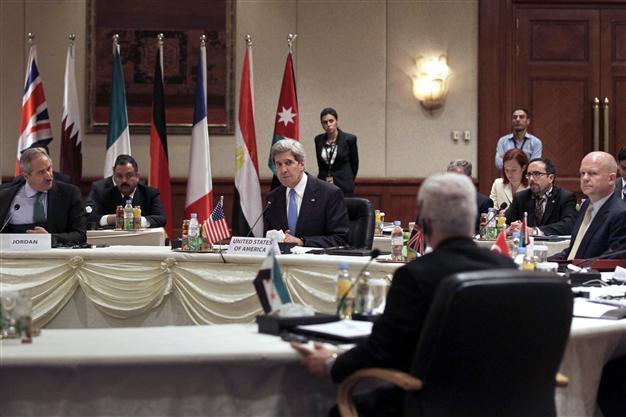Syria agrees in principle to attend Geneva conference: Russia
MOSCOW / ISTANBUL

Jordan's Foreign Minister Nasser Judeh (L), US Secretary of State John Kerry (C) and British Foreign Secretary William Hague (R) attend the "Friends of Syria" meeting in Amman, Jordan on May 22, 2013. AFP Photo
Syria’s staunch ally, Russia, said May 24 that the Damascus regime had agreed “in principle” to attend an international peace conference on the crisis, which world powers hope will take place in Geneva in June.
But Moscow also criticized Syria’s various opposition groups for presenting tough demands that in some cases included the exclusion of President Bashar al-Assad’s representatives from the negotiations. Russian Foreign Ministry spokesman Alexander Lukashevich said Russia had received the Damascus government’s agreement to take part in the Geneva conference during a visit to Moscow by Syria’s Deputy Foreign Minister Faisal Muqdad.
“We note with satisfaction that we have received an agreement in principle from Damascus to attend the international conference in the interest of the Syrians themselves finding a political path to resolve the conflict,” Lukashevich told reporters.
The conference was agreed this month by Russian Foreign Minister Sergei Lavrov and his U.S. counterpart John Kerry. The date of the conference is still unclear, but some reported that the meeting has already been tentatively scheduled for June 10.
However, Lukashevich said reports of a specific date for the conference “cannot be taken seriously” because the ranks of al-Assad’s foes remained so split. “Demands to immediately name a specific date for the conference without having clarity about who, and with what authority, will speak in the name of the opposition, cannot be taken seriously,” Lukashevich said.
The main opposition Syrian National Council (SNC) entered a second day of talks in Istanbul on May 24 aimed at finding a joint approach to what has already been dubbed as the “Geneva 2” conference. The first Geneva meeting in June last year ended in a broad agreement aimed at forming a transition government in Syria and introducing a long-lasting truce. But the deal was never implemented because of disagreements over al-Assad’s role in the new government, and the lack of resolve on either side to lay down arms.
Lukashevich condemned some opposition leaders for declaring that no talks were possible with al-Assad still in power. Moscow has insisted that the talks be held without preconditions. Lukashevich scorned the attempts by the opposition to find a common voice, saying the reports he had seen thus far coming out of Istanbul “have not been encouraging.”
“We are again hearing about the precondition that Bashar al-Assad leaves power, and that a government be formed under the auspices of the United Nations,” he said.
An SNC official also said they had some reservations. “The general atmosphere is that the council will attend the conference,” Khaled Khoja, the SNC’s Turkey representative, told the Hürriyet Daily News, on the sidelines of the ongoing meeting of the Syrian coalition in Istanbul. However, he added that the coalition had some reservations about attending the meeting.
“Al-Assad has to make direct statement saying that Syrian regime will attend this meeting and will accept the concept of the Geneva 2 meeting,” Khoja said. He defined this concept as “transition of all the duties of the state to the interim government, al-Assad has to step down alongside his aides who are also war criminals, and negotiations between the opposition and regime must be held.”
“This concept is our condition,” said Khoja. He said that any statement that is not made by al-Assad or his family would not be valid for the opposition, because “al-Assad is the main decision making mechanism in the regime.”
Abdulbaset Sieda, the former chairman of the SNC, also said he could not see good faith in the regime’s move, as it had been made only to “gain time.”
“We haven’t decided yet whether to attend Geneva 2,” Seida said May 24.
Lukashevich said “everything is being done” by the opposition and their regional allies to make sure that the Geneva conference either does not take place or fails. But he stressed that the United States and Russia were now undertaking joint efforts to make sure that sufficient agreement was reached for the sides to talk to each other soon.
Sevim Songün Demirezen contributed to this report from the Istanbul bureau.
